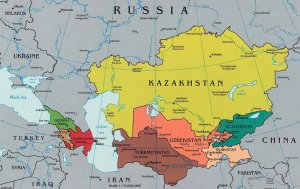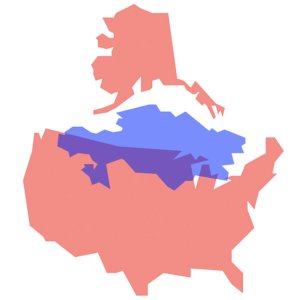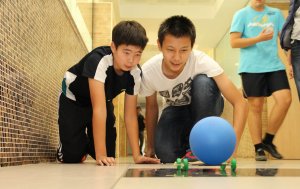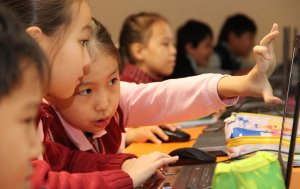PBL, Kazakhstan, and Global Success Skills
Kazakhstan’s public schools have embraced project-based learning as part of a strategy for teaching their children the skills they’ll need to participate in the global economy.
Your content has been saved!
Go to My Saved Content.I sat in a classroom listening to student presentations halfway across the world in a country that borders Russia and China. The topic was energy conservation. Students explored concepts around electricity as a basis for learning more energy consumption at home. They looked at which days showed the highest consumption, and then analyzed the data to determine why and suggest possible solutions. Each team of four students presented their findings and ideas, followed by in-depth questions from a panel of educators, including myself.

Energy use is an important issue in Michigan where I live. But these student presentations happened in Astana, the capital city of Kazakhstan. The winters are sub-zero on the Celsius scale, similar to Bismarck, North Dakota. Ice lies thickly on the roads from snow buildup. The city is heated centrally from a major coal plant. As Astana rapidly grows, its energy supply lags behind increasing demand in the city and the country as a whole. The students seemed aware of this as they reported their findings.
Along with the other teachers that I worked with, I knew that this project-based learning (PBL) experience was the start of something special. There's an adage that if one visits another country, their understanding of themselves and their own country will change their perspective. Having visited several countries, I’ve experienced this truism, yet I could not know the mutually beneficial effect that would occur from collaborating with the educators of KATEV in Astana, Kazakhstan.
KATEV and PBL
KATEV (Kazakhstan ve Türkiye Eğitim Vakfı) is a publically-funded school system that has 36 schools spread across the country. For perspective, the US is 3.61 times larger than Kazakhstan, while Texas is one fourth the size of Kazakhstan.

Imagine working in a school district that spanned almost one third of the U.S. or the entirety of Western Europe! Students from K-12 attend school Monday through Friday until 4PM and Saturday until 1PM.
KATEV's students compete and win medals in national and international academic competitions. This feat is considerable as the department of education mandates that all students learn English in addition to their native language, which may be Kazakh or Russian. Most subjects are taught by teachers who speak English as a second language. While incorporating English is far from easy, they believe that English is the dominant language in which most publications are written. To access knowledge and perspective from the wider world, one must understand the language of its publications. According to my own research, almost 50 percent of global publications are in English, which I find remarkable. The students in Kazakhstani schools could be considered English-language learners (ELLs). Imagine the challenges of teaching students core content in a second language.
In pursuit of academic success under these challenging circumstances, KATEV leadership has embraced PBL as a means to elevate global success skills (a.k.a. 21st-century skills). They recognize the need to help their students become more effective global citizens. Darhanbek Kojabekov, Vice President of HR and PD at KATEV states, "All four skills [collaboration, communication, critical thinking, and creativity] which PBL tries to teach to students are essential in our century. But as I observe, one of the most significant skills is critical thinking. It helps them to initiate their way and perform many useful works in the future. According to the PISA test, Kazakhstan is at about 40th. Only memorization of facts would not help students in their future careers."

Complex content knowledge without global success skills leaves students lacking in the necessary ways to apply and implement that knowledge with any depth or qualitative meaning. Just like schools in the U.S., U.K., South Korea, and Australia, KATEV wants to transform traditional classroom learning to embrace the vibrant world of student creativity and innovation that can and should exist outside of traditional instruction.
Good PBL experiences start with planning that maintains the focus on standards or key learning outcomes. Keeping the end in mind is critical to learning and making meaningful connections to the world beyond school. KATEV teachers use this basis for their implementation. Like many schools that adopt PBL, they have questions for how to improve the students' learning experience, such as formative assessment practices, student voice, and global success skills.
Formative Assessment Checkpoints
Good formative assessment that's used in traditional instruction can also be used in PBL experiences, so long as the tools are effective. Formative assessment examples include exit tickets, journaling, think-pair-share, peer feedback, and quizzes. KATEV is currently exploring checkpoints. Each week, there should be at least one or two checkpoints when students must complete a task or assignment that builds on the learning needed for a full PBL experience.

Each checkpoint gives teachers and students the opportunity to evaluate progress, and diagnose any support needs. For early projects, teachers use this strategy to coach students on self-management and organization skills. We often forget that students are indirectly trained to be passive participants in their learning. They follow teacher directions about listening to instruction, what tasks to do, when to ask questions, and which product options to choose from. PBL empowers students to take action toward owning their learning -- provided that teachers use a gradual release structure, such as checkpoints.
Student Voice
Giving students freedom to explore learning challenges and determine their preferred means of demonstrating their product can transform school culture into a business world culture that is collegial and productive. Like other teachers across the globe, KATEV teachers understand this value, and recognize that the most difficult obstacle for student voice is teachers giving up the need to control everything. Yet acknowledging this issue does not make it easy to change and give up control.
Give students the opportunity to work on academics in a real-world context. Instead of scenarios, present them with authentic opportunities to contribute to a community, organization, or client. The result is that students will elevate their work. (For example, those presentations on energy conservation created a positive experience for the students.) The next step is connecting them to the decision makers or influencers for impacting practice.
NurOrda, one of the KATEV schools, already has a rich culture of student voice for authentic learning experiences. After school, students participate in a variety of clubs. One club focuses on motion pictures. Students write, direct, and act in their films to tell stories while learning the craft of filmmaking. The films are shown on the school’s YouTube channel. Each year, the school produces the NurOrda Oscars. Some videos are for entertainment value, while others have important social advocacy messages, such as:
- Life Offline: What happens when the online world consumes one’s life
- Who will take out the garbage: A social experiment on becoming caretakers of the school community
The connections to speaking, writing, and reading standards are foundational for such efforts, with science, social studies, and math as possible thematic focus. Connecting this rich after-school club experience to what happens during the academic day is an important challenge for KATEV schools. With the power of social media apps for phones and tablets, classrooms everywhere have a wealth of opportunities for students to communicate or address any audience's needs.
Global Success Skills
For its size, Kazakhstan's population is relatively small at almost 18 million. (Texas was over 25 million as of the 2010 census.) The nation's future may be dependent on how their children grow into a world where they can navigate a global economy. KATEV wants their students to develop global success skills that universities and businesses want to see for their students and employees, respectively. Yerjan Aubakirov, a school principal, states, "For us, critical thinking, communication, and creativity are very important. Because of the curriculum, these skills are not taught properly at schools. That's why we intended to teach these global success skills by PBL." KATEV finds the traditional academic strategies of memorization and passive learning unacceptable. They're interested in connecting their students with classrooms abroad for shared learning of subjects and global success skills.
During my visit, I learned much about KATEV's deep commitment to empowering their students. Their monthly academic themes, where students display works in those related fields, remind me of the rich experiences at the annual district-wide PBL event by Metro National Public Schools, and also, the annual Exhibition Night hosted by Berrien Springs (Michigan) High School. Such public events give students opportunities to grow their experiences with global success skills.
It’s not just that KATEV places a premium on their students’ academics, valuing such success as U.S. schools honor achievements in sports. The staff goes further in their desire to place students in the forefront by empowering them to lead their learning. Their student culture is amazing, as they express a deep appreciation for their teachers and are given freedom to work and interact outside of the classrooms, such as the hallways and cafeterias.
I’ve seen a similar culture at the High Tech High campuses and in some New Tech High Schools such as Kent Innovation High in Grand Rapids, Michigan and Columbus Signature Academy in Columbus, Indiana. KATEV shares good company when it comes to culture. They excel in this area in ways that other schools could learn from. I certainly did. KATEV may still have a long road ahead before their PBL dream is fully realized, but their commitment toward this goal through action gives them a running start on many schools locally and abroad.
Connect With KATEV
The KATEV staff welcomes opportunities for their students to engage in joint learning with students abroad. Please contact them or post your interest in the comment section below.
Contact Information:
- info@katev.kz
- petroktl@gmail.com: Mr Yerjan's school
- kktl@mail.ru: Karagandy ktl for boys
- galaxyschool2014@gmail.com: Galaxy International school in Almaty
- alkizktl@gmail.com: Almaty high school for girls
- nurorda.edupage.org, elementary@nurorda.kz
